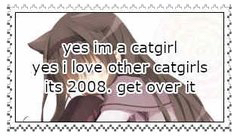Yakuza 0: Stupidity, Seriousness, Parity and Life
Published 2022-04-08
Often, there are games with great stories, but terrible gameplay; the gameplay is really fun, yet the soundtrack isn't there; the soundtrack tugs you off in bed, but the story goes for the Vietnamese Landmine.
This is a deviation from that norm.
Yakuza 0 is one hell of a game. Like, it fucking owns, so hard.
I recently decided to play it some more at nights to wind down before I go to sleep. This then shifted to me playing it after I woke up, too. And everywhere in-between. I got sucked down the rabbithole all over again.
But just what is so enticing, so alluring about it? What about Yakuza makes me go "yes, all of this, I want it, right now, in my face"?
Well, to be wholly honest, I can't really articulate it.
Which is a bit of a pisser, because that does sort of render this post a bit of a pointless exercise.
Not that that's any different from my other posts, mind you.
As mentioned previously, Yakuza 0 is a bit of an outlier in this regard; it's so expertly crafted in every department that you can't help but appreciate it. Yakuza 0 is the quintessential Yakuza game, too, if judged by this metric: it has the best plot, the best music, the best gameplay, the best side content.. everything about it is just so good. Yet I can't find one main thing on which I stake my enjoyment of the series.
The side content is incredibly wacky and silly, whilst still never overstepping the boundary into trying overly hard to present itself as such; and this is why it works so well. We get to see Kiryu, our protagonist and straight man, placed into these overly absurd situations, reacting in different ways based on the situation at hand - disgust at a high school girl exploiting her fellow students for her monetary gain, but a hesitant affection for a live chicken he wins when bowling, for example. A live chicken which he then makes into a fucking business manager for his real estate firm. Which isn't played up, or anything - Kiryu simply receives a chicken, and makes it run his business, fuck you. In a lesser game, the protagonist would remark on how silly and absurd this situation is in order to force laughter, but Yakuza is so confident in how fucking stupid it is that it sees no reason to reinforce what is already obvious - that being that this shit is fucking wack, dude.
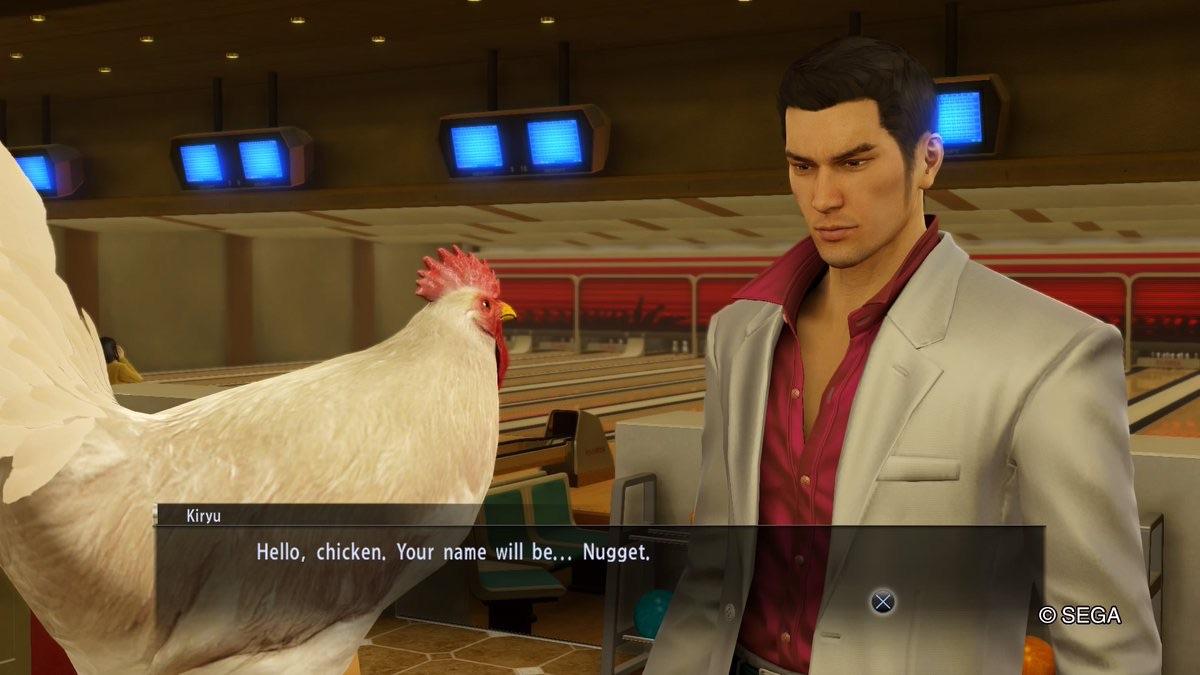
Contrast this with the main plot; it's a hammed-up, cheesy, melodramatic as fuck crime drama. And I love it. It spirals off from Kiryu doing a collections run that goes wrong, ultimately resulting in him being framed for the murder of the person he was to collect from. To make matters worse, the incident took place in a prime real estate spot: the Empty Lot - a space the size of a postage stamp, yet incredibly lucrative, potentially promising the person who owns it an exponential increase in revenue. The Empty Lot is on the police radar as a result of the death, and so Kiryu is subsequently forced to leave the yakuza, but he wants answers. Just what significance does the Empty Lot hold? Who is this girl that they keep referring to in relation to it? Who really did murder that bloke and set up Kiryu? Why the fuck is Kiryu's taste in suits so god-awful? You will find all of these answers and more as you play through the game, and that's only from our first protagonist.
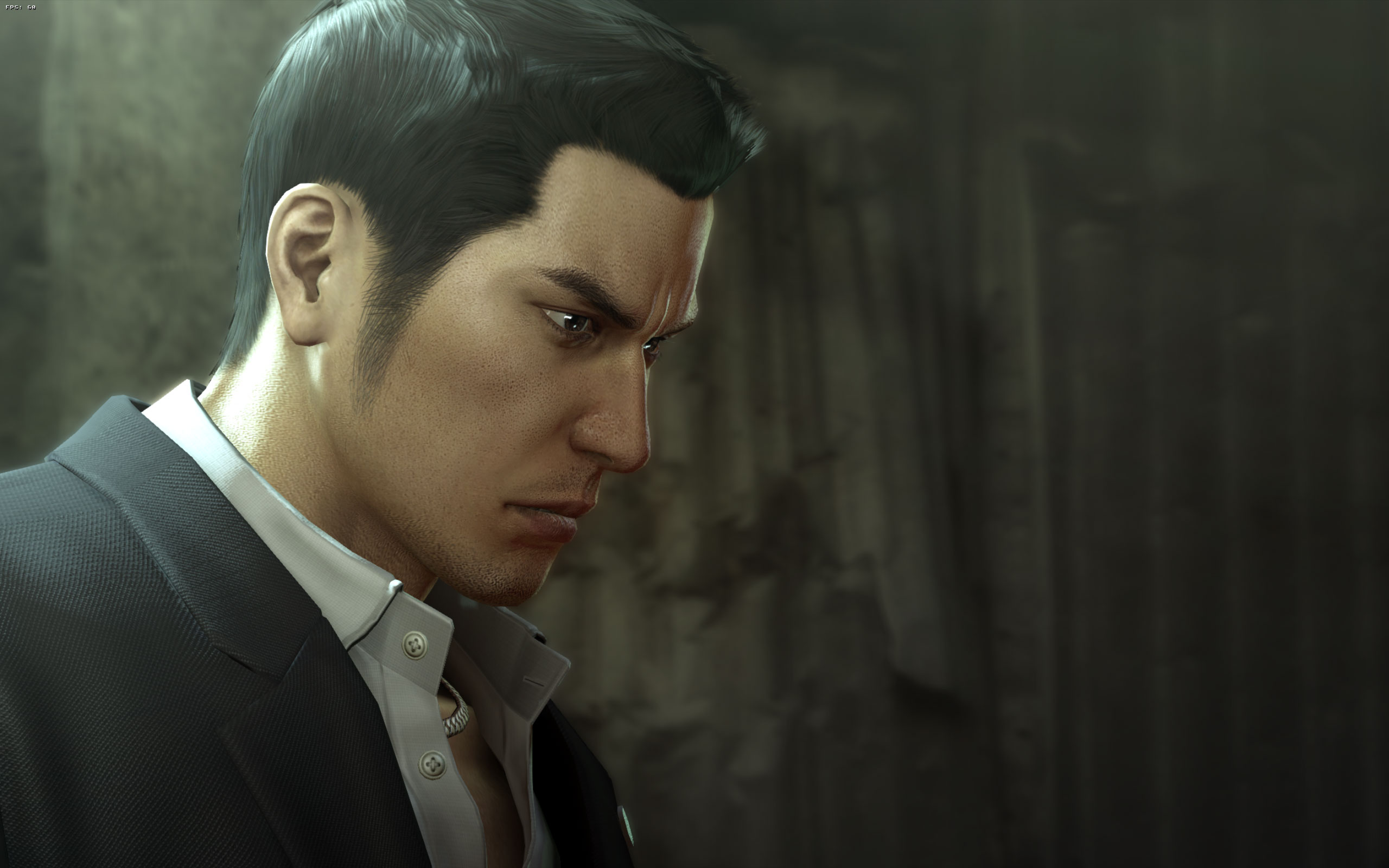
Our other playable character is fan-favourite Goro Majima; this game's plot focusing heavily on what he did after the 1985 Ueno Shooting, and his descent into his more recognisable persona as the Mad Dog of Shimano. As a fan of the series, this is rewarding: the Ueno Shooting was already explored through the lens of the supposed perpetrator and Majima's sworn brother, Taiga Saejima, in Yakuza 4, as well as his life after the event - to get the other side of the story and see what Majima got up to in the years between the hit and the events of the first Yakuza game is greatly rewarding to somebody who has played through the games prior to these ones. Yet, it still manages to be a compelling plot outside of that to new fans, as it follows Majima struggling to win his position back in the yakuza, as he is punished by being made to manage and run the classiest club in Osaka - The Grand Cabaret. After the club sees great success under Majima's management, he receives one final job in order to get him back in: assassinate Makoto Makimura. Majima goes on a wild goose chase to find this person, originally believing them to be the God Hand masseuse of Hogushi Kaikan. This, however, is revealed to be untrue; God Hand is actually Wen Hai Lee, a former professional assassin turned acupuncturist. Makoto is somebody else entirely, leaving Majima in turmoil as to whether he can go through with his hit or not. Again, this sets up the plot nicely, just as with Kiryu, leaving us with many questions; will Majima assassinate Makoto? Will he get back into the yakuza? Why is his taste in suits so much better than Kiryu's?
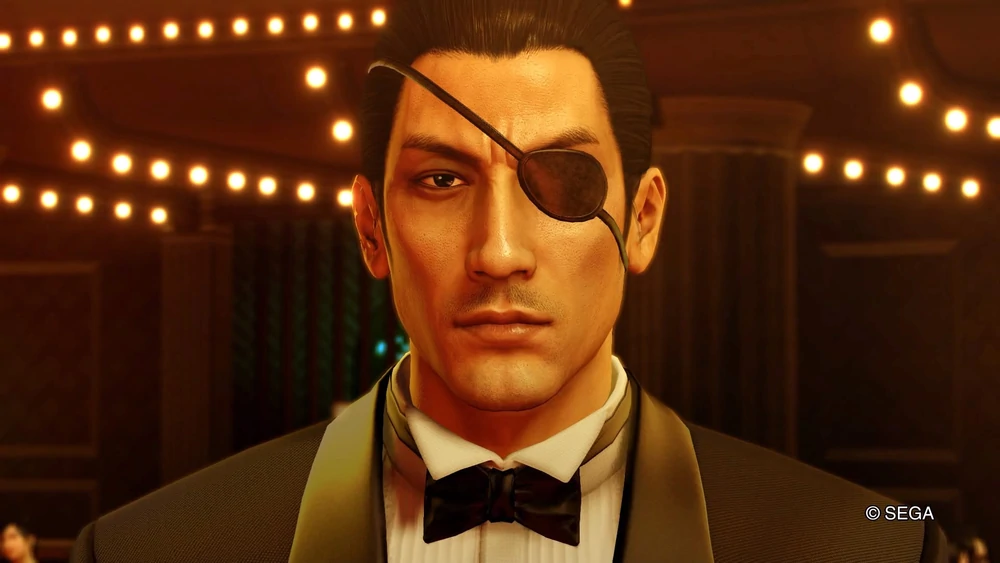
Of course, there is a great contrast between these wacky antics and this somewhat serious (although undoubtedly not overly serious) plot: you can play as a hot, muscly man delivering a pizza whilst really dumb music exclusive to that substory plays in one moment, only for that same man to then go back to being embroiled in a murder mystery leading to him being framed and trying to beat the shit out of everybody in the yakuza who has wronged him, and then some. Now, whilst in most games, such a tonal clash would be an unwelcomed, jarring failure, again, Yakuza is an outlier; if anything, the game wouldn't be as great as it is without the tonal whiplash. I love the fact that I can run into random people, helping them with their day if they're good and in need, beating the shit out of them if they're dickheads, using swordfish as guns (I don't know either but it's there?????) and just generally pissing about in a facsimile of downtown Tokyo.
That leads me onto another reason why I adore Yakuza as a whole; the locations, especially the virtual tourism aspect. From the beginning of the series, RGG Studio made it their aim to attempt to make the most realistic depictions of the locations featured in their games as was humanly possible with the technology, and throughout the series, we got to see them evolve - both as technology was improving, and as the real-life locations were changing. This is flipped on it's head, as Yakuza 0 provides us a look back in time, to an image of Kamurocho, the mainstay location of the series, in the height of the Japanese Bubble period of the late 1980s, where money was plentiful, lights were bright, and life was good. It is packed to the gills with arcades, bowling alleys, batting cages, karaoke bars, regular-ass drinking bars, seedy underground cat-fighting rings, shops, restaurants... everything that you can think of, really. As a result of how much shit there is, Kamurocho is incredibly densely packed: it's streets are tight and claustophobic, it's more open areas mostly being dedicated to roads, or to act as meeting spaces. It's very much a representation of that very flashy, yet seedy red light district image brought to life, whilst also being incredibly loyal to the real life location of Kabukichō in Tokyo on which it was based.
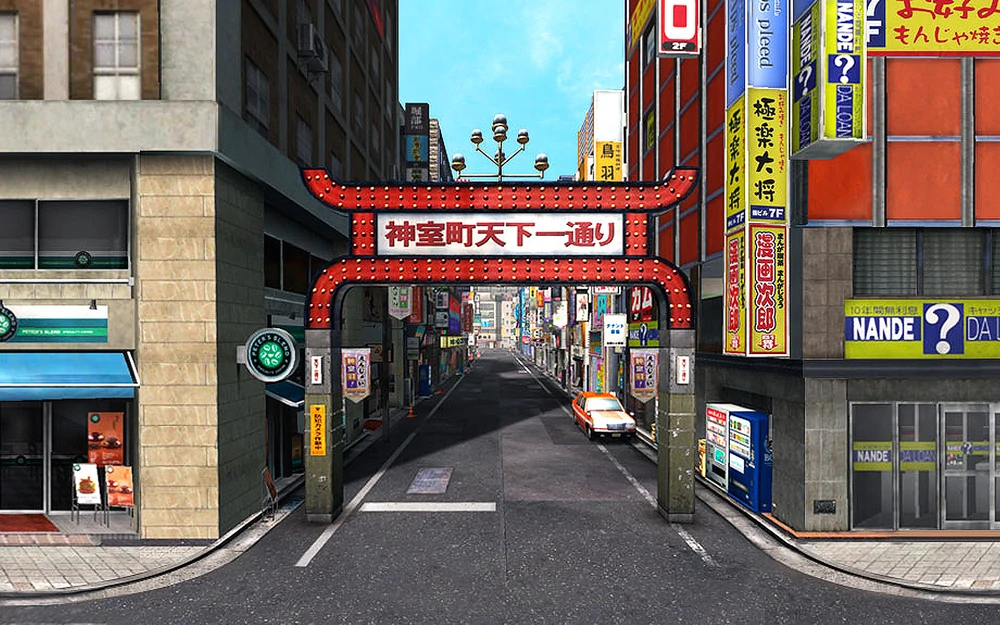
Our other location is Sotenbori, a location based on Dōtonbori in Osaka, and one that's wholly different in feel to Kamurocho; Sotenbori features a lot more open space in comparison to Kamurocho's densely packed entertainments, a wealth more mom-and-pop styled shops, street vendors, book stores, and most notably, bridges! Indeed, Sotenbori allows us to take in the lovely sight of the Sotenbori River - at the bottom of which there is likely a new riverbed formed of corpses from the amount of dudes I've chucked off of the bridges over the course of playing these games. This river acts as the central point of the town, around which everything else is constructed: footpaths line either side of the river to allow easy access from one bridge to another, small restaurants line the streets, and generally, there is a bit less in Sotenbori than there is in Kamurocho. This is certainly not a bad thing: it is both accurate to the real-life location, and in a gameplay context, it also forces the player to consider where they go to stock up on items and such.
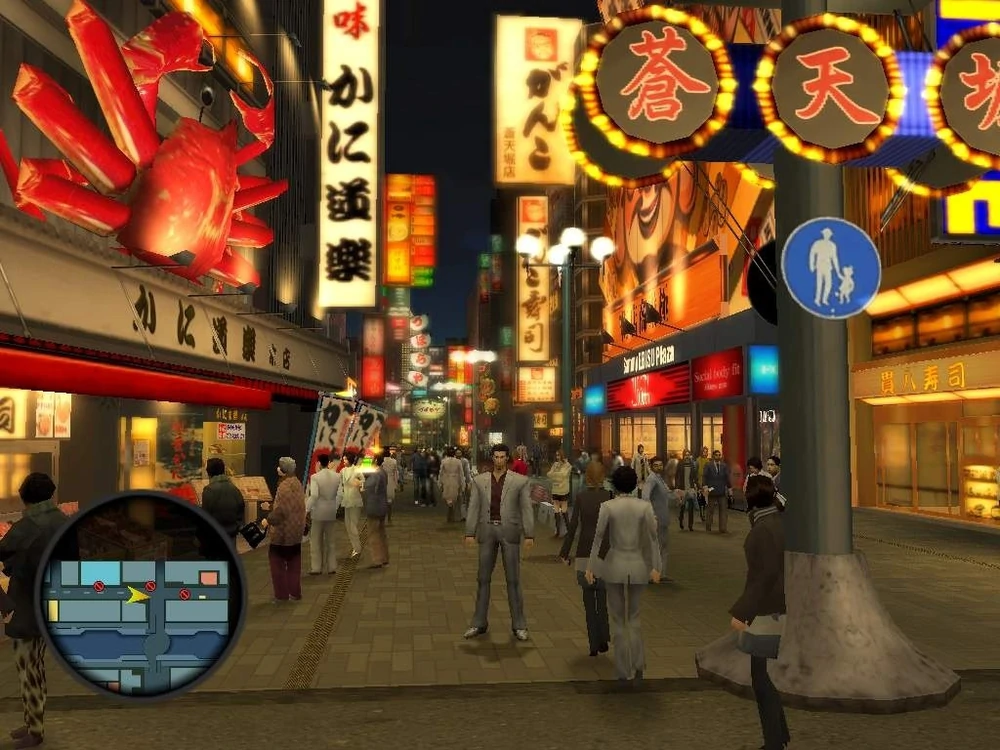
The realism of these places is helped further by the use of real-life brands and licenses in order to make the locations even closer to reality - for example, the bars stock Beefeater and Jack Daniels. These places feel so lived-in, so real, almost breathing. They become characters in of themselves in the series; every time I step back into Kamurocho, I feel a warmth, a homely feeling. I feel like I'm exploring somewhere that I have actually lived before, as opposed to just a video game map. Dude, it's gotten to the point where, nine times out of ten, if I boot a Yakuza game I've already played, I'm just there to bask in the vibes of these immaculate representations of Japan, and I barely even need to look at the in-game map to get around - I just now know the streets off the top of my head, where everything is, and so forth. When exploring, there is no soundtrack, you merely hear the hubbub and chatter of passing civillians. It is a truly breathtaking display of attention to detail, and a clear showing of the developers' passion for their craft and for their country.
The way that all of these facets combine hammers home a message constantly hammered in by the series, both in side content and in the main game: life can be a bitch, but it's also very beautiful at times. Yes, Kiryu and Majima may both be pushed into terrible situations, but they don't allow it to stop them from acting, nor do they let themselves wallow in their lower moments; they keep going, for what they believe in, for who they love, for justice. And it is so fucking corny. And I fucking love it. It's why I can get so easily invested in these games. Relatability. We may not be able to directly relate to the position Kiryu or Majima are in, yes, but we can emphathise with them, we see their emotions get the better of them, we see them be people, living their lives.
...Too pretentious? Yeah, alright, I'll wind down.
Overall, the tone and atmosphere of Yakuza 0 is a masterclass in balancing the gritty with the absurd, the silly with the serious and the mental with the menial. This is a great contributing factor as to why I adore it so god-damned much, along with the rest of the series prior to this game. I haven't even scratched the surface on the characters, their relationships, and why I fucking adore them, but frankly, I think I'd get RSI attempting to do so within this already incredibly beefy post. If you did read all of this stupid dumbass gushing and nerding out, thank you very much. Have a nice picture of a cat.


















